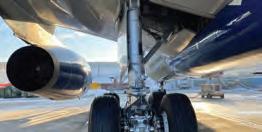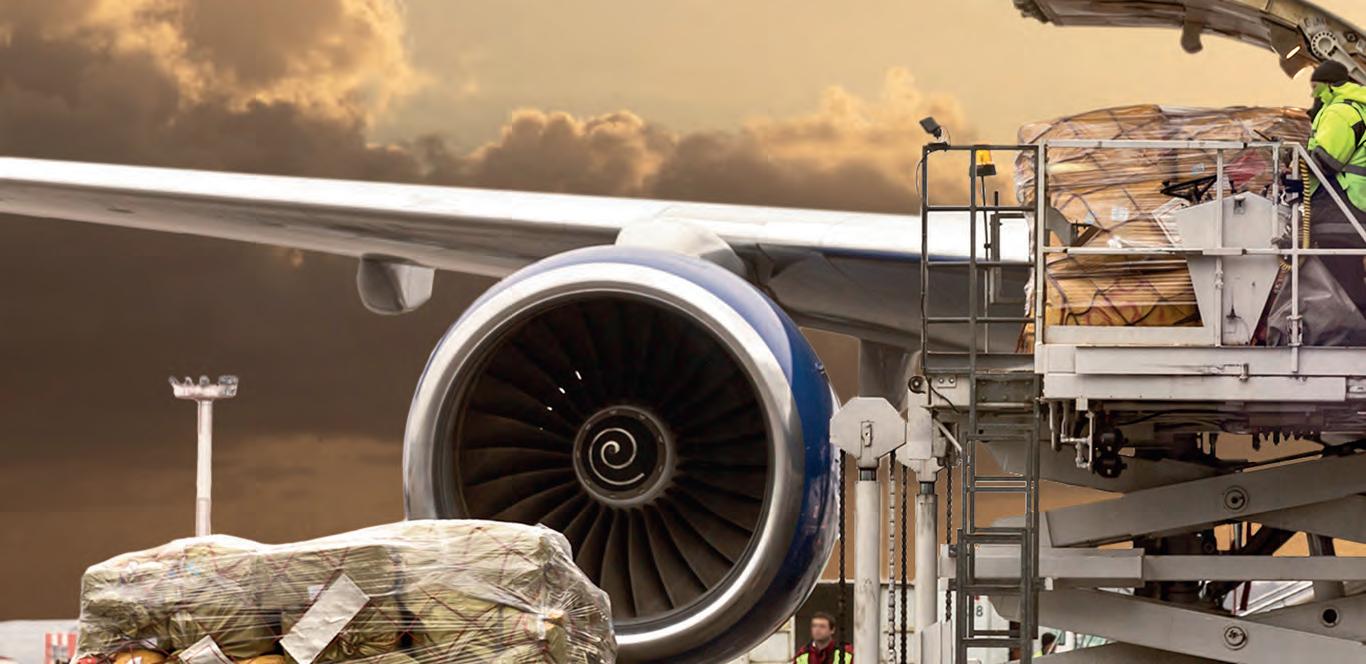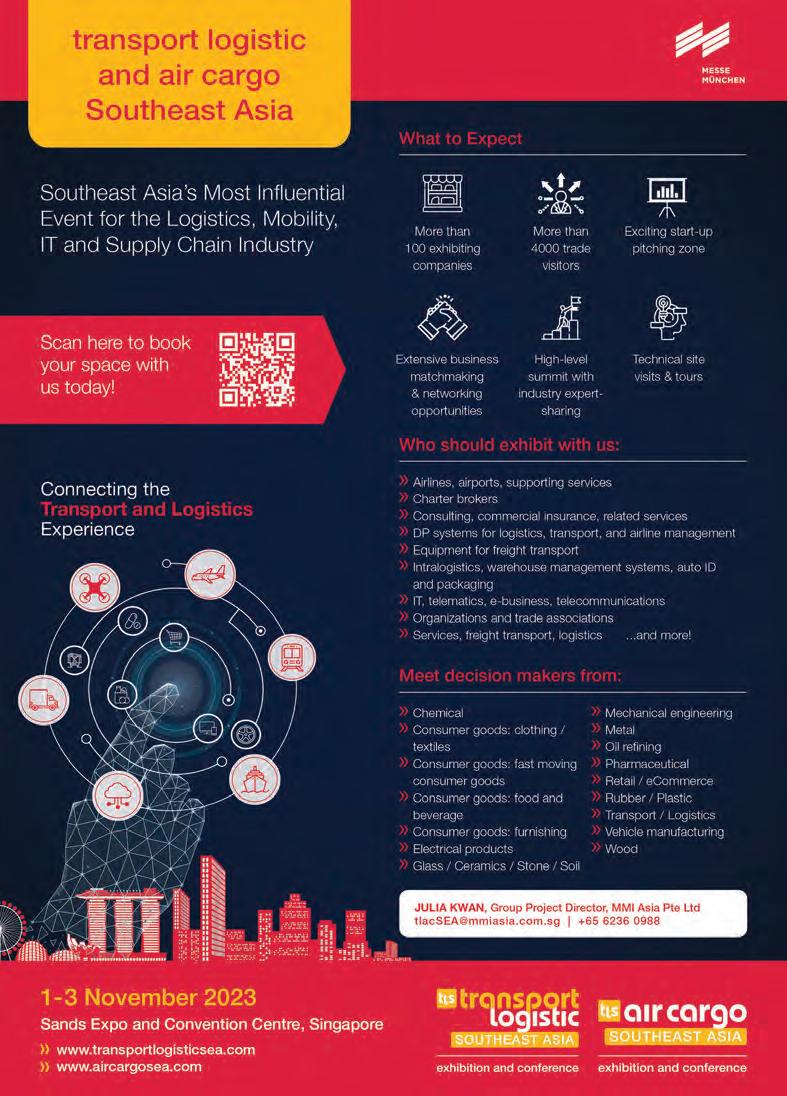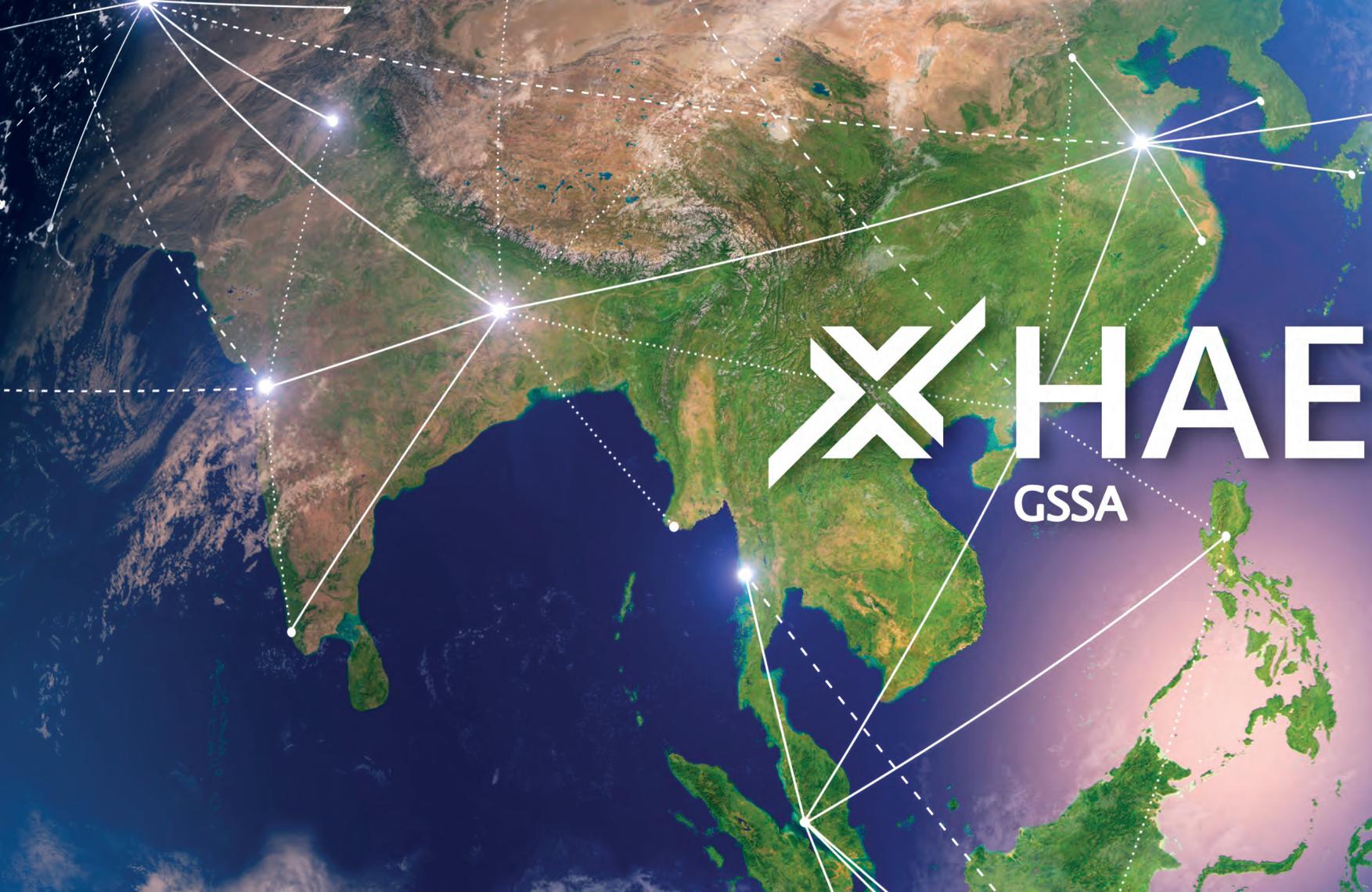




















































dnata has broken ground on its new, 20,000 m2 cargo warehouse which will add significant expansion to its operations at Erbil International Airport (EBL). The facility represents an investment of $14 million and will create up to 50 additional, direct jobs with dnata in Iraq.
The foundation stone for the cargo warehouse, which is scheduled for completion in September 2024, was recently revealed by dnata’s Senior Vice President for UAE and Iraq Airport Operations, Jaffar Dawood.
“We are delighted to expand our operations in response to the growing demand for our reliable and safe cargo services in Erbil,” Jaffar said.

“Our new facility will incorporate cutting-edge technologies and the latest carbon reduction initiatives in design and operation, ensuring the
highest level of operational and environmental efficiency for our customers. We stay committed to the Iraqi aviation industry and continue to invest in our operations to contribute to the development of Erbil as a regional cargo hub.”


dnata’s newest cargo facility will be capable of processing 100,000 tonnes of cargo annually, including perishables, pharmaceuticals and dangerous goods. dnata will also implement its advanced ‘OneCargo’ system within the facility, digitising processes and maximising efficiencies across its cargo operations in Iraq.

The facility will be equipped with the latest technologies, including thermal insulation to reduce the building’s environmental impact by maintaining low CO2 manufacturing emissions and operating costs. Additional, environmentally sustainable features include a water harvesting
system, which recycles condensed water, low energy skylighting, and an all-electric forklift fleet. dnata’s latest expansion follows the opening of a new, advanced cool chain facility and a bus maintenance facility in 2022 at EBL. The company currently provides ground handling and cargo services to over 25 airlines with a team of over 400 aviation professionals.
In recent years, dnata has also made strategic investments in new cargo facilities in London and Manchester (UK), Karachi and Lahore (Pakistan), and additional cargo capacity and infrastructure in Brussels (Belgium), Sydney (Australia) and Toronto (Canada). In addition, last January the company announced an investment of over €200 million in one of the world’s largest and most advanced cargo facilities, dnata Cargo City Amsterdam, at Schiphol Airport in The Netherlands.


THE NATO pipeline supplying Brussels Airport opened for the transport of Sustainable Aviation Fuel (SAF) on 1st January 2023. From now on, SAF can be supplied in a fast and environmentally friendly way via this system, an important milestone to increase the use of sustainable fuels in the coming years and reduce CO2 emissions.
“This is an important milestone in making aviation more sustainable at Brussels Airport. Having sustainable aviation fuels available at

the airport has been a priority for us and we are pleased that, thanks to NATO’s support, this has now been realised. As an airport, within the framework of our European Stargate programme, we have expressed the ambition to aim for 5% SAF on total kerosene imports by 2026. That is faster than the European target, but we want to fully commit to this together with our airline partners. The fact that our home carrier Brussels Airlines is already taking the lead with a first order of SAF is a great start

Brussels Airlines transported the very first batch of sustainable aviation fuel via the route at the start of the year, operating a symbolic first SAF flight to Malaga. “To achieve our climate goals, we will have to drastically increase the use of alternatives to fossil fuels in the coming years. Next to fleet renewal, sustainable aviation fuel is the most effective tool currently available to reduce emissions from air travel. Together with the Lufthansa Group, we have already invested in the production and use of SAF for several years. The fact that we can now transport the sustainable aviation fuel from the blending facility all the way to our aircraft at
The Neste MY Sustainable Aviation Fuel used by Brussels Airlines is produced from sustainably sourced, 100% renewable waste and residual raw materials, including used cooking oil and animal fat waste. Brussels Airlines purchased 2,000 barrels of 1,000 litres each with a blend of 38% SAF for this pilot project. The sustainable aviation fuel was transported by Brussels Airlines from Neste’s blending facilities in Ghent via the pipeline to the fuel storage facility at Brussels Airport just after midnight on 1st January.

Based in Geneva, Switzerland, with more than 33 years of experience and representing dozens of GSSAs around the world, the Federation of Airline General Sales Agents (FEDAGSA), the association has witnessed the evolution of the industry.
The GSSA has two customers – freight forwarders requiring a service and the carrier who may be offering such a service or part of it. Having developed beyond the traditional model, modern GSSAs do more than just sell carrier space, they have become solution stops for carriers who want to outsource processes.
“Carriers seek more services and GSSAs seek to supply those,” Glenn Shires, Secretary General of FEDAGSA, said. “The impact on the GSSA is that they need more tools and in some cases the knowledge of how to use them.”
To aid in that, FEDAGSA offers its members a range of tools and services, meaning that they can provide pretty much whatever the carrier is asking. With the service side undoubtedly increasing, FEDAGSA sees increasing alliances between its members to provide network and area services when required.
While times have been challenging for the air cargo industry, GSSAs have managed to weather the storm by being inherently flexible in their approach. Members created services to meet the needs of forwarders when carriers were down, adding a charter leg if necessary to make connecting services work during the pandemic. Even now, GSSAs are making services available. “Think about it and the value of the offline GSSA can be incredible,” Shires said.
This ability to adapt and remain strong has been shown in how GSSAs have been pretty good at retaining staff throughout the pandemic, avoiding the labour challenges that other companies are now facing, as they rebuilt from the impact of Covid. Unfortunately though,
there are some barriers that cannot be dodged. “Inflation is hitting everyone,” Shires accepted. Although, there are ways to mitigate its effects, with technology helping them make sure their top line rises with inflation, protecting jobs and, ultimately, the business.
Having seen digitalisation coming fast preCovid, FEDAGSA created Tricargo.aero – a window available to all forwarders, so they can see what’s on offer and who from. “It’s free for the forwarders of course and, with all our members starting it off in January, we even have other platforms joining in and FIATA smiling too. We are neutral and not-for-profit so of course its the tool you would expect us to come up with,” Shires explained.
This swift embrace of technological innovation came while other parts of the airfreight sector were slow to adapt to digitalisation. “The GSSAs got it about right – watching what works and more importantly what doesn’t. GSSA has two Ss because the service side is absolutely vital to getting repeat business.”


While many challenges abound internationally for the airfreight industry, and other global sectors, falling volumes is the main area of concern for GSSAs. After all, they rely on having a booming cargo market to ensure business remains strong. “We only make money if we sell and if we sell less for less then this is bad for business. We have to be inventive – and we fortunately are.”
Amid these challenges, GSSAs might hope that governments would act in the best interests of industries that keep the world moving smoothly. Unfortunately, that’s not the case, as governments have been often too slow to combat the issues that have impacted the supply chain. FEDAGSA is no stranger to the problem of this inefficiency, with Shires highlighting how government either don’t know or can’t do much for the industry.
“In fact, if government were just not in the way, things would flow better and changes could be

made faster in response to market needs.”

When asked what governments could do, if anything to aid the industry, Shires stated that “if we could ask for anything it would be to wake up to the monopoly situations at airport operators, to remove the block exemptions on non-governmental organisations that hide behind them and shut people down for restrictive practices. Let’s have fair clean markets. That would be nice.”
Looking ahead Sustainability is playing an increasingly key role in the airfreight

industry’s thinking, as companies look to become more environmentally friendly. For sustainable options to truly be developed, its first important to understand what ‘sustainable’ really is. Batteries aren’t a completely clean option, pollution has moved east, etc. “Follow the science, not governments, to get clean quicker,” Shires said.
“Some of our members have really jumped aboard this cause and others are seeking to show to the customers “greener” options,” Shires explained. “FEDAGSA is watching closely because if a genuine auditable green standard is created in airfreight
we will get behind it. We are on high alert for the inevitable “greenwashing” seen in say the auto industry.”
Airfreight isn’t a stationary industry. It’s ever changing. As the GSSA model has evolved over time, there will be further development in the future. There has been some significant consolidation over the years with some GSSAs becoming bigger than many of their carriers. However, the start ups are “coming through really well and carriers are learning to choose a la carte sometimes”. “It is fascinating to watch of course and FEDAGSA is always here to help all of our members big or small,” Shires stated.
Fresh from celebrating its 25th anniversary, HAE Group is looking ahead to further expansion in 2023, as it seeks to expand into new and evolving markets. Despite the challenges that have and, to some extent, still exist within parts of the Asia-Pacific region, the General Sales and Service Agents (GSSA) has seen a lot of demand emerging from the boom of e-commerce market and other types of air cargo moving to/from China.
“There is significant inventory out there at the moment and we are working on a number of projects to offer new destinations and origins,” Ian Hutchinson, Chief Commercial Officer of HAE Group, said. “We have finalised our joint venture in China and are preparing to launch in January, so this is our key market for 2023.”
Ensuring that they are prepared for the potentially rapidly changing situation in China and the surrounding region, HAE Group has a series of measures in place, including an “existing network of collection and delivery partners.” This allows HAE group to participate in several linehaul networks to/from Asia, constantly sharing capacity updates and rates for up to the minute information. Similarly, the GSSA subscribes to multiple data sources to allow it to spot trends and opportunities.
“Finding the right partner is key but once you have that and can navigate any foreign ownership restrictions, China remains a natural expansion target for any company,” Hutchinson added. “There is pent up demand of a whole spectrum of air cargo that we hope will come back in 2023.”
HAE prides itself on always embracing change. To remain at the forefront of the sector, when its airline partners needed more options, the GSSA stepped up with innovative new ways to win more business at the best possible yield. “For our forwarding customers, this also meant options with varied transit times, price options and even service options or extended service options,” Hutchinson explained.
“More choice is back in the market now, so we have to be able to offer multiple criteria to customers, which includes speed, service, additional services and sustainable ones as corporate clients will want to ensure what we do and what we offer is best practice.”
With the industry moving into the digital space over the past few years, HAE launched its customer login on its portal, so customers can interact with and enhance their relationship with the GSSA. For airlines, HAE has used this online arena to produce dashboards so they can easily manage the fast pace and dynamic nature of the

industry. “The online portals have been an interesting development, but they have also underscored the value of a GSSA as someone who can support the end-to-end nature of our business.”
Digitalisation is key, not just for the booking, but for promoting the activities of companies in the GSSA sector and their importance in the airfreight process. “We have continued and sped up digitisation of our business. Our QMS system now enables us to offshore, extend the hours we can service our airline partners and customers for and speed up how we quote and aid spot pricing for many of our carriers,” Hutchinson stated, highlighting how the company has embraced technological innovation.
“It’s not just about A-B a rate and off we go. Airline products, handling, cut offs, incentives, customer recovery and service are all still needed and not everything can be automated. The most agile GSSAs will be able to adapt to a revised role and how they can contribute.”
Alongside digitalisation, sustainability is playing a key role in HAE Group’s development as it seeks to stand out in a crowded field. With companies looking to work with others that share their greener practices, the GSSA acknowledges that its “shareholders are rightly pushing us on these topics.”
“We believe some of our practices internally on reducing our carbon footprint are key, we are also looking to be an enabler in this market in 2023, as we are working on partnering with a solutions provider who can facilitate carbon offset programmes,” Hutchinson said, citing how “there is no one doing this in a verified manner in our market at the moment.”
Fortunately HAE has been shielded from much of the disruption the industry has experienced in recent years, as many of its partners are freighter operators, HAE Group worked to keep vital supply chains open. “We tripled our charter activity to include areas where there was no service. Yields were up significantly on a global scale by over 30%. While actual activity slightly declined or remained flat in terms of air waybills, the value and size of shipments were significantly up,” Hutchinson said.
Customer relations played a key role in HAE’s continued success and development over the past few years, with the GSSA having invested a substantial amount of time and effort in its marketing, so those interested would be aware of what they airline partners could do for customers.
However, despite HAE’s success in recent years, there are
unavoidable challenges hitting all aspects of the airline industry, and other sectors around the globe. “Demand does seem to be slowing. With some yields in decline, we are focusing on activity so quotes, shipments and volume. We have some niche markets that have not experienced this decline but maintaining activity is key.”
“Inflationary pressures are all over our industry, as airlines and GSSA companies attempt to ramp up their staff numbers again. Our attrition rate is reasonably stable,” Hutchinson stated. “We have to be agile and we are not immune to the same pressures as everyone else. As global cargo yields decline, we will need to be as efficient as possible to remain competitive in the workplace.”

“There are functions that used to be done in country that our systems now allow us to do offshore. This helps us focus on the commercial activity in country and our offshore team manage our operations. This evolution has allowed us to work 24/7 for track, trace, follow up and administration. It has actually improved productivity.”

Etihad Airways has announced the appointment of Arik De as its Chief Revenue Officer, overseeing a new organisational division focused on revenue.
Since April 2022, De has served as Vice President of Revenue & Commerce at Etihad Airways, responsible for revenue management and e-commerce.
“With the world quickly returning to pre-Covid levels of travel, we have a unique opportunity to build on and strengthen our leading position at Etihad Airways,” Antonoaldo Neves, Chief Executive Officer, said.
“Our new Revenue division will deliver state-ofthe-art revenue management capabilities, broaden our airline partnerships and enhance our network to better serve our guests and our home of Abu Dhabi. Arik has had a substantial positive impact on our revenue performance over the past nine months, and I look forward to closely working with him as we build on these interdependent areas, which are critical for financial sustainability.”
Elbe Flugzeugwerke
10th
DHL Express, launch customer for EFW’s A330-300P2F programme, is currently the biggest operator of the A330-300P2F fleet. DHL Express’ A330-300P2F fleet is set to continue to grow, with eight more aircraft on firm order to be redelivered by EFW of which some are already inducted for a conversion in Dresden, Germany at EFW. Together with partner airlines EAT, ASL and Air Hong Kong, DHL Express is operating its A330-300P2F fleet in Europe and Asia, as well as on transatlantic flights from Leipzig/ Germany to the US.
“DHL Express is delighted to welcome the 10th A330-300 P2F to its aircraft family. Since becoming the first operator to take delivery of the A330-300 P2F in 2017, the aircraft has proven to be ideally suited to short- and mid-range sectors in Asia Pacific and Europe. The aircraft delivered today is the youngest aircraft we have converted to date and we are excited to see it serve our customers in Asia from 2023 onwards,” Malcolm Macbeth, Senior Vice President Global Network Management DHL, said.
“EFW has been a trusted converted freighter solution provider

for DHL and its network partners for decades,” Jordi Boto, CEO of EFW, said. “Our 10th delivery of an A330-300P2F to DHL is an important milestone for our A330P2F programme and longstanding partnership with DHL. We are very happy to be supporting DHL’s operational needs throughout these years, and are fully committed to helping them grow their new-generation Airbus freighter fleet further with our A330P2F programme.”
EFW’s A330P2F programme is developed in collaboration with ST Engineering and Airbus, with EFW holding the Supplemental Type Certificate and leading in the overall programme as well as marketing & sales efforts. The A330P2F programme comes with two variants – the A330-200P2F and A330-300P2F – which are both equipped with advanced technology that offers airlines additional operational and economic benefits. The A330-200P2F can carry a gross payload of up to 61 tonnes of weight to over 7,700 km, while the larger A330-300P2F can carry a gross payload of up to 63 tonnes and a containerised volume of up to ~18.581ft3 (~526m3).
ST Engineering and EFW have conversion sites in Singapore, Germany, the US and China. To meet the rising demand for freighter conversions, ST Engineering and EFW will work with third party conversion houses with facilities in Turkey and China to support the A330P2F programme.

Having started his career over 20 years ago in finance at the International Monetary Fund, De has spent the last 15 years working within the aviation industry.

He has previously held leading positions at WestJet, Air Asia, Aeroméxico, and most recently, TAP Air Portugal, where he was the Chief Revenue & Network Officer.
In this newly created role, which will report to the Chief Executive Officer, De will oversee key revenue-related functions including Revenue Management, Distribution & E-commerce, Network Planning, Alliances & Joint Ventures, Aeropolitical & Industry Affairs, and Etihad Guest, the airline’s loyalty programme.

De holds a Master’s degree in Finance and Policy from the University of Chicago.
“I am excited to take on the Chief Revenue Officer role at a time of such opportunity, as international travel demand kicks into high gear.
Etihad Airways has an incredible product, service and team behind it, and I look forward to working together to enable growth and deliver value as we take our airline to new heights,” De said.